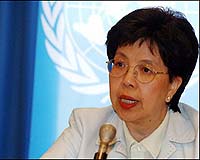| . |  |
. |
Buenos Aires (AFP) July 15, 2009 Health ministers from six South American nations hit by the swine flu pandemic met in Buenos Aires on Wednesday to coordinate defenses against the virus which has killed nearly 200 people in the region. The ministers from Argentina, Bolivia, Brazil, Chile, Uruguay and Paraguay are alarmed at the momentum the A(H1N1) virus has picked up in their countries, which have entered the southern hemisphere's winter. Argentina, hosting the gathering, has been worst-hit. It counts 137 confirmed deaths and more than 3,000 infections, giving it the worst fatality toll in the world after the United States, which has 211 deaths and more than 30,000 infections. Chile has 33 deaths, Uruguay has 15, Paraguay has six, Brazil has four, and Bolivia has two. In terms of confirmed infections, Chile has the most, with 10,491 counted, though tallying methodology appeared to vary across the region. A World Health Organization (WHO) tally gives a total of more than 430 deaths around the world and 94,500 infected cases. Although Uruguay's president, Tabare Vazquez, said Wednesday that swine flu appeared "more benign" than the run-of-the-mill seasonal flu, which kills tens of thousands every year, Chilean President Michelle Bachelet said the flu outbreak was the "worst in 50 years." The increased risk for younger people and incomplete data for the virus was of concern. There were also fears that the flu might mutate further, perhaps becoming more virulent, as occurred with the 1918 Spanish flu pandemic that caused tens of millions of deaths. WHO chief Margaret Chan warned that no vaccine against A(H1N1) would be ready before mid-September -- after the southern winter ended. Although hasty development efforts by drug labs should have a vaccine created in August, "clinical trial data will not be available for another two to three months," she told Britain's Guardian newspaper. She has also warned that poorer countries would receive the vaccine after richer nations. Brazilian Health Minister Jose Gomes Temporao said before the ministers' meeting it was "urgent to coordinate actions." "The region must share medicine and supplies to treat the sick," he said. An Argentine health official added that worries that developing countries would suffer a lag in getting the vaccine was also to be discussed. In the meantime, South American nations are pushing forward with individual strategies to stem the spread of the flu. Paraguayan President Fernando Lugo announced Wednesday that winter school vacation in his country had been extended by a week to prevent classroom contamination. In Chile, extra medical personnel were being recruited and anti-viral drugs were being bought. Public events drawing crowds were suspended. Bolivia was carrying out mass vaccinations for common flu, even though they were ineffective against the A(H1N1) virus. Elsewhere in Latin America, there were also concerns. In Mexico, where the swine flu first came to light, there have been 124 deaths and 12,521 infections. Authorities there say the flu is out of control in the southern state of Chiapas, a region popular with tourists that has recorded 1,900 infections. Central America has seen 10 deaths, seven of them in Costa Rica. Share This Article With Planet Earth
Related Links Epidemics on Earth - Bird Flu, HIV/AIDS, Ebola
 WHO chief doubts speedy swine flu vaccinations
WHO chief doubts speedy swine flu vaccinationsLondon (AFP) July 15, 2009 The world's top health official said Wednesday a vaccine to combat the surging swine flu pandemic would not be readily available for months as the number of deaths from the virus spiralled. The comments by World Health Organization chief Margaret Chan came as Australia and Japan reported a surge in cases of the A(H1N1) virus, and Argentina dramatically upped its death toll from 94 to 137 in ... read more |
|
| The content herein, unless otherwise known to be public domain, are Copyright 1995-2009 - SpaceDaily. AFP and UPI Wire Stories are copyright Agence France-Presse and United Press International. ESA Portal Reports are copyright European Space Agency. All NASA sourced material is public domain. Additional copyrights may apply in whole or part to other bona fide parties. Advertising does not imply endorsement,agreement or approval of any opinions, statements or information provided by SpaceDaily on any Web page published or hosted by SpaceDaily. Privacy Statement |